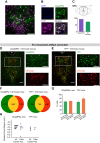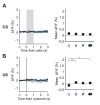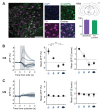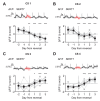Activity patterns of serotonin neurons underlying cognitive flexibility
- PMID: 28322190
- PMCID: PMC5360447
- DOI: 10.7554/eLife.20552
Activity patterns of serotonin neurons underlying cognitive flexibility
Abstract
Serotonin is implicated in mood and affective disorders. However, growing evidence suggests that a core endogenous role is to promote flexible adaptation to changes in the causal structure of the environment, through behavioral inhibition and enhanced plasticity. We used long-term photometric recordings in mice to study a population of dorsal raphe serotonin neurons, whose activity we could link to normal reversal learning using pharmacogenetics. We found that these neurons are activated by both positive and negative prediction errors, and thus report signals similar to those proposed to promote learning in conditions of uncertainty. Furthermore, by comparing the cue responses of serotonin and dopamine neurons, we found differences in learning rates that could explain the importance of serotonin in inhibiting perseverative responding. Our findings show how the activity patterns of serotonin neurons support a role in cognitive flexibility, and suggest a revised model of dopamine-serotonin opponency with potential clinical implications.
Keywords: Serotonin; Serotonin-dopamine opponency; Surprise; mouse; neuroscience; perseveration; reversal learning.
Conflict of interest statement
The authors declare that no competing interests exist.
Figures






















References
Publication types
MeSH terms
Grants and funding
LinkOut - more resources
Full Text Sources
Other Literature Sources
Molecular Biology Databases

